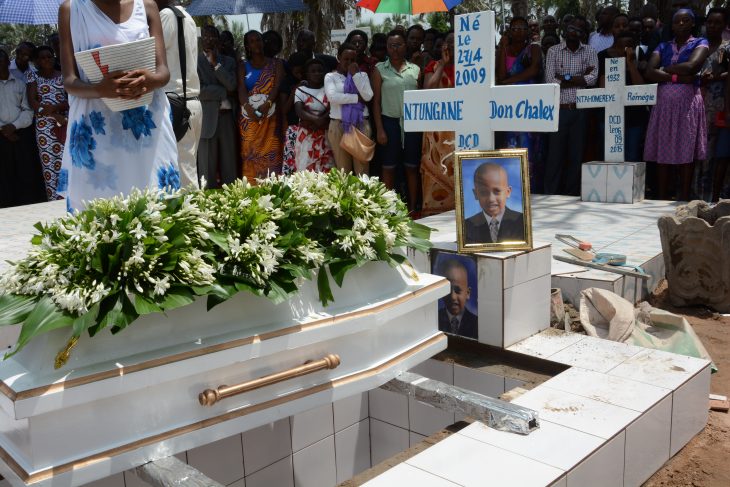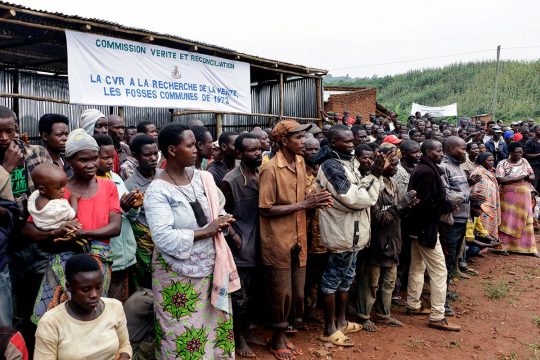Relations between Burundi and Rwanda are deteriorating, amid accusations and protests in Bujumbura against Kigali’s alleged interference. But Rwanda has always denied these allegations, saying Burundians must solve their own problems instead of looking for scapegoats next door. Justiceinfo.net takes a closer look.
On Saturday February 13, thousands of Burundians answered a government call to demonstrate in the streets of the capital against Rwanda, especially its President Paul Kagame. “Kagame is an enemy. We will do him in,” was one of the cries. Neighbouring Rwanda is accused of “training certain Burundian refugees residing in Rwandan refugee camps and recruiting them to assassinate Burundian leaders and overturn Burundi’s democratically elected institutions”, to quote Bujumbura mayor Freddy Mbonimpa.
Pascal Nyabyenda, president of the ruling CNDD party and also of the National Assembly, had set the tone in a communiqué published on February 2. He accused the Rwandan head of State of creating a rebellion with the benediction of certain mafia-like European political people like Louis Michel” (Belgian diplomat and European MP) to “bring back to power” former Tutsi president Pierre Buyoya.
Kigali has always rejected these accusations, saying Burundians need to solve their internal problems instead of looking for a scapegoat on the other side of the Akanyaru river, which separates the two countries.
When independent UN experts and Washington also accused Rwanda a few days ago of seeking to destabilize its southern neighbour, the regime of Burundian President Pierre Nkurunziza was overjoyed and stepped up the rhetoric against Rwanda. This also came as the African Union put an end to plans to send a sizeable peacekeeping force to Burundi.
This is not the first time that some voices around the world have accused Rwandan President Kagame, rightly or wrongly, of playing a destabilizing role in the region. But is Kagame really the main person responsible for the crisis into which Burundi has been sinking deeper and deeper for nearly a year now?
“Nkurunziza is the problem”
“Even if it were proven that the Rwandan government is training and arming Burundian refugees to carry out assassinations in their native county, Kigali would only be taking advantage of a situation created by the current regime in Bujumbura,” says a Burundian activist exiled in Tanzania who prefers not to be named. “Perhaps it is true that Rwanda is pouring oil on the flames, which should of course be condemned, but it was Pierre Nkurunziza in person who started the fire by violating Burundi’s basic laws and stubbornly refusing to negotiate with his fellow citizens. Is the Burundian president trying to make us believe that the solution to the current crisis is through negotiations with Kagame and not with his Burundian opponents?”
"Those who say that Rwanda is helping refugees to go to fight Nkurunziza want to say that the problem is between Rwanda and Burundi,” exiled former president of the National Assembly told Voice of America (VOA) on Monday. “Nkurunziza wants to make this problem an ethnic problem. But it's a political problem; it's a problem of one person – Nkurunziza – who wants to stay in power without any legitimacy."
"He [President Nkurunziza] begins with Rwanda,” Minani continued. “Tomorrow it will be Tanzania, Uganda, Kenya, and Congo. It is his strategy."
“This crisis provoked by the despot Pierre Nkurunziza pits him against many Burundians who reject his dictatorship, which is busy destroying the fruits of a hard won peace,” reads a statement from the leadership of the Resistance for Rule of Law in Burundi (RED-Tabara), which presents itself as a new rebellion against the regime in Bujumbura.
A short memory
Former Burundian president and now Senator for life Sylvestre Ntibantunganya also calls on the Nkurunziza regime to start a dialogue with his opponents, starting with those for whom he has launched international arrest warrants, accusing them of participating in the May 2015 coup attempt. “It is with them that the regime should have the courage to negotiate,” Ntibantunganya wrote in an online think-piece. “The talks should focus on an immediate end to the violence, urgent reconstruction of sectors such as the security forces, political parties, civil society and media which are highly destabilized, and reforms to the composition and functioning of the Constitutional Court and Independent National Electoral Commission before organizing real pluralist, inclusive elections that are guaranteed as transparent, just and fair.”
Ntibantunganya reproaches the Nkurunziza camp with having a short memory. He reminds us that 20 years ago the president of the time Pierre Buyoya rejected advice to negotiate with rebel groups including the CNDD-FDD which is now in power. “Never will we negotiate with the tribal-terrorist genociders” was Buyoya’s response. Ntibantunganya recalls also that Nkurunziza was himself sentenced to death under Buyoya’s regime, which accused him of planting anti-tank mines in the capital Bujumbura, causing several victims. “Nevertheless between 2001 and 2003 negotiations did take place with the CNDD-FDD led by Nkurunziza!” he writes. “No-one can deny that it was these negotiations that brought peace to Burundi.”
The Senator for life says that negotiations today “should bring face to face those behind the current crisis who violated the Arusha Accord for Peace and Reconciliation in Burundi to obtain an illegal and illegitimate third mandate for Pierre Nkurunziza, and all those who opposed it, including those the regime calls putschists. That is the key to peace in Burundi.”
“Any outside attempt to spark the flames in Burundi in any way should be condemned. But the root of the current crisis is in Burundi itself, and any solution must come from there,” says an African diplomat in Kigali. “So the problem is not Rwanda or Belgium or Paul Kagame or Louis Michel.”






